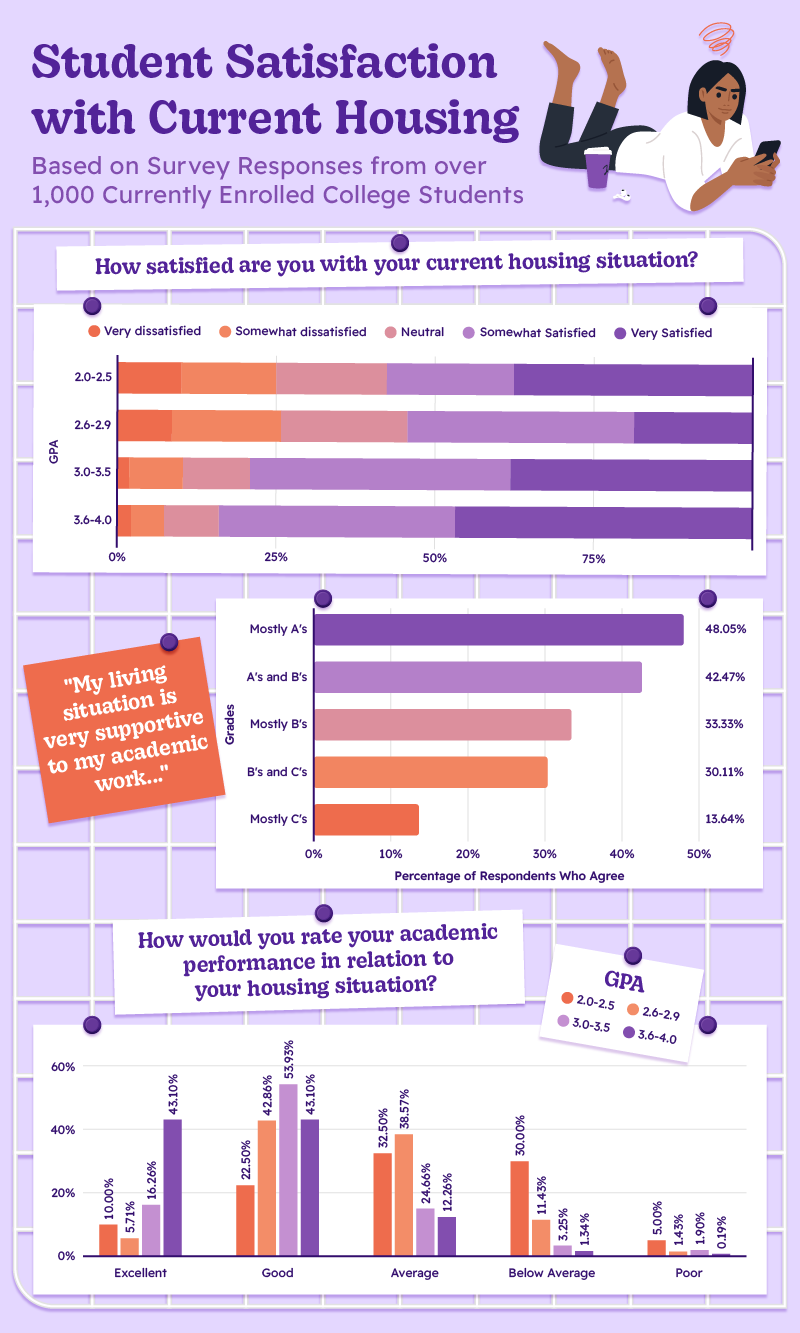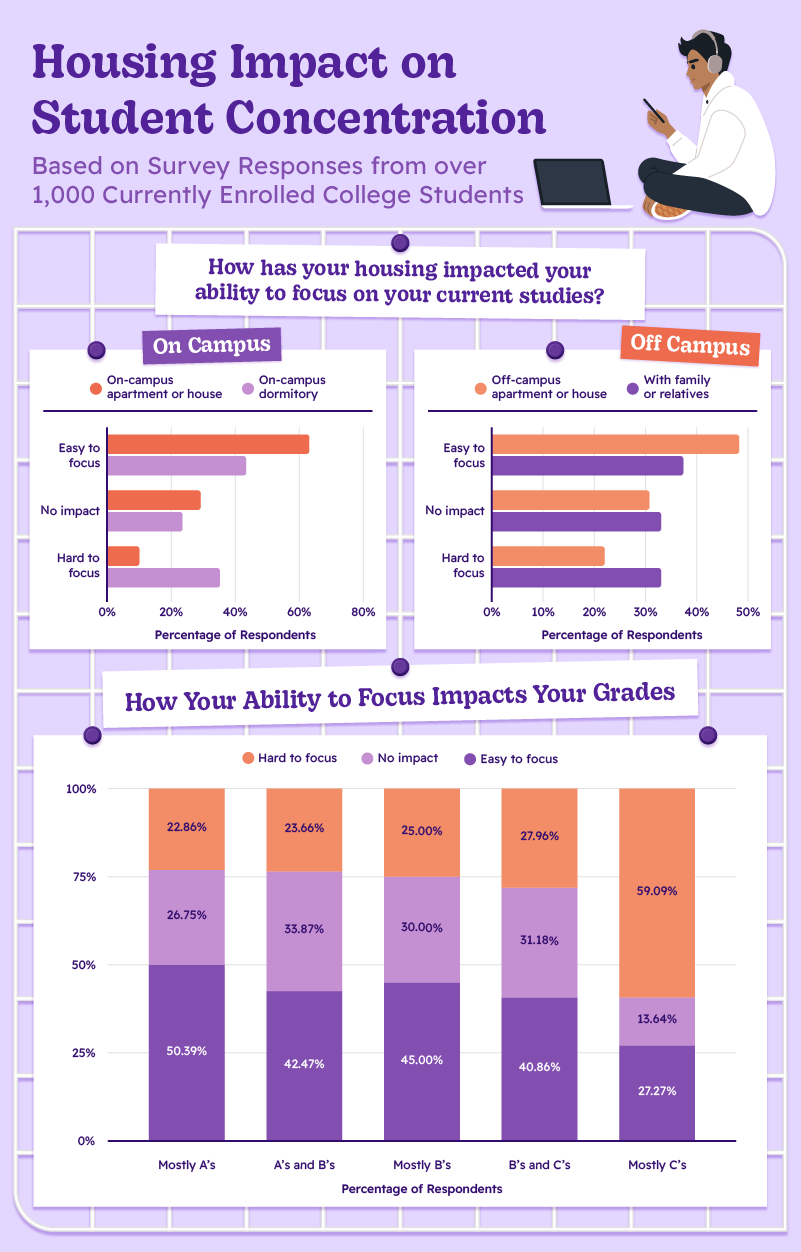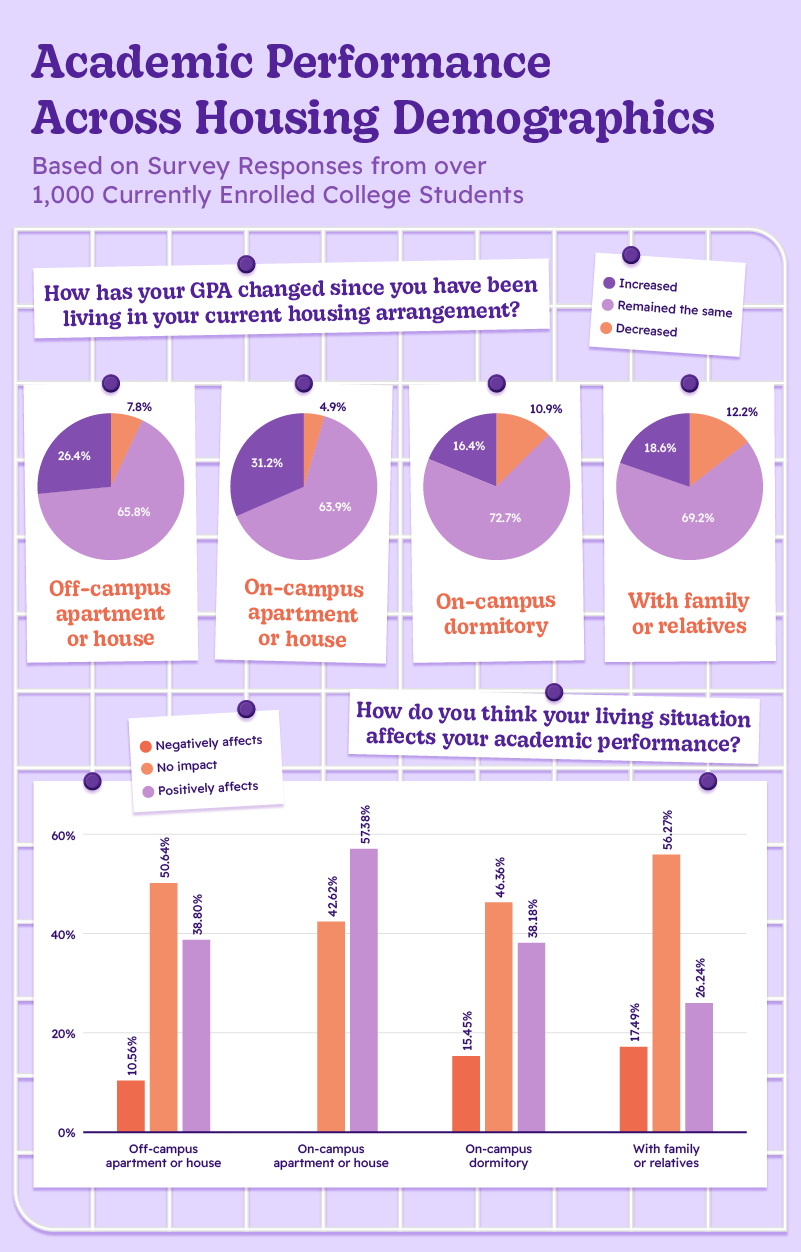Living On Campus vs. Off Campus: Comparing Academic Success Outcomes

While some universities mandate on-campus residency for freshmen (a policy not adopted by Grand Canyon University (GCU)), the decision between living on or off campus remains significant.1 Living on campus typically means shorter commutes to classes, whereas living off campus can offer more space to call your own.2 But how does living on campus vs. off campus impact academic performance?
To find out, GCU, in collaboration with Grand Canyon Education (GCE), surveyed 1,003 college students across the U.S. at undergraduate and graduate levels. This survey aimed to understand student satisfaction with their living situations and how these choices influence study habits, concentration and overall academic prosperity.
Keep reading to uncover insights into how your living situation throughout college could potentially influence your grades, daily commute and more.
In this article:
- Methodology for the Impact of College Housing on GPA, Focus and More
- Student Perspectives on College Housing and Its Influence on Academic Life
- Access to Academic Resources: Comparing Living in a Dorm vs. off Campus
- College Housing Influence on a Student's Focus
- Comparing Academic Outcomes: Living in a Dorm vs. Living off Campus
- Closing Thoughts: The Influence of Living on Campus vs. off Campus on Academic Performance
Methodology for the Impact of College Housing on Academics and More
To assess the influence of college housing on academic performance, we carried out an extensive survey among 1,003 students enrolled in undergraduate and graduate programs. This survey spanned three weeks, from Nov. 28 to Dec. 19, 2023. Our primary objective was to understand the extensive impact of college housing on students' academic success and well-being.
The survey included a carefully structured set of questions. These were designed to gauge student satisfaction with their current housing arrangements and to examine the impact of these living conditions on their study habits, concentration and overall academic results.
Furthermore, we undertook a detailed analysis of the survey results across various demographics, paying particular attention to the types of college housing the respondents lived in and their current academic standings to draw nuanced insights into the relationship between housing conditions and educational outcomes.
How College Housing Impacts Students’ Academic Life

We surveyed students on how well their current housing situation supports their academic studies. Continue reading to discover if living in a dorm or other on-campus or off-campus housing plays a significant role in determining students' academic performance.
Overall Satisfaction With College Housing
We discovered that a majority of college students are content with their current living situations. Notably, 79% of those surveyed college students reported satisfaction levels of either 'somewhat satisfied' (38%) or 'very satisfied' (41%) with their current housing.
However, there is a considerable segment of 10% who remain neutral, alongside 8% who are somewhat dissatisfied. A smaller proportion, 3%, expressed being 'very dissatisfied' with their housing arrangements.
Students residing in off-campus and on-campus apartments report high satisfaction levels, with 44% and 46%, respectively, feeling 'very satisfied.'
At GCU, we offer housing options that include amenities such as laundry facilities, kitchens and even courtyards, all tailored to foster student satisfaction.
Conversely, students living in a dorm exhibit greater dissatisfaction with their current housing situation. Nearly 1 in 6 express feeling 'somewhat dissatisfied,' and 5% are 'very dissatisfied,' marking the highest level of discontent among the housing options. The reduced privacy and increased noise levels typical in on-campus dormitories might contribute to this dissatisfaction among college students.3
Students living with family or relatives have higher levels of neutrality (14%) and dissatisfaction (9% 'somewhat dissatisfied' and 5% ‘very dissatisfied') compared to apartment dwellers.
Interestingly, we found that students with higher GPAs (3.6 to 4.0) report the greatest level of 'very satisfied' at 47%, while the lower GPAs (2.6 to 2.9) report the lowest percentage of 'very satisfied' students at 19%.
Supportive Living Environments Foster Student Success
Most respondents find their living environment somewhat or very supportive of their academic work (77%). This suggests that the majority of participants may benefit from conducive study conditions at home, highlighting the importance of a supportive living space in fostering academic success. Factors contributing to this supportive environment may include a quiet and comfortable study area, access to necessary resources, and a positive atmosphere that encourages concentration and learning
Students residing in on-campus apartments or houses report the highest level of 'very supportive' environments at 48%, with off-campus apartments following closely behind (42%). This high satisfaction among on-campus residents may be attributed to the strategic design and management of these living spaces, which are often tailored specifically to meet the needs of students. On-campus housing typically offers close proximity to academic buildings, libraries and other resources, facilitating easier access to study materials and learning opportunities.
Additionally, these environments are likely to foster a strong sense of community among students, providing a network of peer support that can be crucial for academic motivation. The integration of these elements into on-campus living arrangements may be one contribution to the perception of a more supportive academic environment.
Interestingly, we found less satisfaction with dormitories, with 1 in every 6 students living in a dorm reporting that their housing is not supportive of their academic work. Dormitories were the largest percentage of the housing groups sharing academic impact dissatisfaction (15%).
Although dormitories might come with their own set of challenges like social gatherings, limited space and other distractions that could potentially impact academic achievements, they remain a favored housing option for college students.4 Additionally, GCU is ranked by Niche.com as having the #1 best college dorms in Arizona in 2024.5
Overall Housing-to-Academics Rating
Among students with GPAs between 2.0 and 2.5, a significant 30% of them rate their housing as below average in relation to their academic studies. In contrast, those with a GPA of 3.6 or higher are more likely to rate their housing as excellent, with 43% expressing this level of satisfaction.
Access to Academic Resources: Comparing Living in a Dorm vs. off Campus
As a college student, choosing between living on campus or living off campus often involves weighing various trade-offs. In the next section, we zoomed in on how living choices can affect their commute times and access to academic resources.
Proximity to Academic Resources
A significant portion of undergraduate students (35%) report that accessing academic resources from their current residence is 'very easy.' These resources encompass a range of services, including tutors, library facilities and professors' office hours. Easy access to these resources can be crucial for college students as it may directly impact their ability to efficiently manage their coursework, seek help when needed, and fully engage with the academic community. Access to these resources can potentially enhance their overall educational experience.
Notably, students with predominantly A’s and those with a mix of A’s and B’s say they have 'very easy' access to academic resources, at 39% and 37%, respectively.
Conversely, students with a mix of B’s and C’s represent the largest group (18%) who find accessing these resources 'somewhat difficult.' This correlation suggests that the challenge of reaching academic support services may be a contributing factor to these students not achieving the highest grades. Difficulty in accessing essential resources may hinder timely assistance and information retrieval, potentially leading to gaps in understanding and lower academic performance.
Commute Time
Over a quarter of students living off campus face a commute exceeding 30 minutes (26%). This extra travel time may impact their academic goals by reducing the time available for studying, increasing daily fatigue and potentially leading to less engagement in campus activities and support services.6
Notably, those with mostly B's and C's who reside off campus report the longest commute times. Among this group, 60% travel more than 15 minutes to reach campus.
College Housing Influence on a Student's Focus

Dealing with a roommate who is a night owl or one who plays loud music could challenge your ability to sleep and concentrate on studying. We delved into how student housing affects students' ability to focus on their academic work.
Overall Focus
Students residing in apartments, both on and off campus, are the largest groups to report that their housing has made it much easier to focus on their studies (25%, respectively).
Conversely, students living in a dorm represent the largest group (35%) who report that their housing negatively affects their academic focus.
Interestingly, among students with a GPA above 3.0, 1 in 3 participants said that their housing has no impact on their study concentration. In contrast, over 30% of students with a GPA below 3.0 report finding it somewhat or much harder to focus due to their living conditions.
Roommates and Other Distractions
60% of students indicate that their roommates do not significantly impact their study habits. However, 15% report a negative effect, while 24% observe a positive influence from their roommates on their academic work.
A considerable 33% of students have experienced academic disruptions due to their roommates. Interestingly, female students are more likely than male students to report a negative impact on their ability to study due to roommates (17% vs. 13%).
Students residing in on-campus apartments or houses form the largest group to report a positive effect of roommates on their academics (38%). On the other hand, those in on-campus dormitories are the most likely to experience a negative impact from their roommates on their studies (22%).
This could be due to different college policies, where some institutions let students select their roommates, while others assign roommates at random, often in the case of first-year students.7 The choice or lack thereof in roommate selection can significantly influence academic performance, as compatible living situations can lead to a more conducive study environment, while mismatched pairings might result in distractions and conflicts.8
Comparing Academic Outcomes: Living in a Dorm vs. Living off Campus

Whether you're aspiring to join a competitive nursing program or aiming for a degree in psychology, it’s important to have housing that doesn't negatively affect your GPA. We delved into the potential correlation between housing and academic performance, discovering that positive housing conditions may potentially boost your GPA. Keep reading to explore our findings.
GPA Change
The vast majority of students (67%) report that their GPA has remained stable since moving into their current housing. Our findings also showed that men make up the majority (19%) who report a moderate improvement in their GPA, while a smaller percentage of women (14%) note a similar level of progress.
Notably, 1 in 4 surveyed students residing in on-campus apartments or housing state their GPA has moderately increased since living in their current accommodation.
Housing vs. Academic Performance
Most students (51%) say their living situation has no significant impact on their academic performance. However, 37% observe a positive impact, while 12% experience a negative effect.
A notable 57% of those residing in on-campus apartments or houses state their living situation positively affects their academic performance.
In contrast, students living with family or relatives form the largest group (17%) reporting a negative impact on their academic performance due to their living situation.
Closing Thoughts: The Influence of Living on Campus vs. off Campus on Academic Performance
The insights from our survey on college housing reveal a clear link between living conditions and academic success. While a large majority of students are satisfied with their housing, nuances such as gender differences and the varied experiences between apartment and dormitory living stand out. Notably, students with higher GPAs often report more supportive housing environments, underscoring the importance of conducive living spaces in academic achievement.
However, it's not just about where you live but also how you live. Beyond the mere location, the quality of one's living situation — including dynamics with roommates and the capacity for concentration — plays a vital role. The data suggests that while roommates may not drastically impact academic work for the majority, the right roommate situation can positively influence study habits, and consequently, grades.
Commute times and access to academic resources also emerge as critical factors, especially for off-campus dwellers, affecting not just time management but overall academic engagement. While the majority of students believe their living situation doesn't significantly impact their academic performance, those who enjoy supportive housing conditions tend to report better focus and higher GPAs.
In essence, our findings illuminate the complex relationship between housing and academic success. As students navigate their college years, the choice of housing — be it on-campus dormitories, apartments or living with family — can have profound implications on their academic journey. It's not merely about a place to sleep; it's about creating an environment that nurtures growth, learning and personal development.
Are you excited to pursue your degree and experience life on campus? At GCU, we invite you to explore our vibrant campus life through one of our campus visitation programs. Choose from day visits, overnight stays or even trips with travel reimbursement options9 to fully immerse yourself in the GCU experience.
During your visit, you can sample campus dining, delve into your academic interests and tour our facilities, including our heated pools. Ready to embrace the full Lope life? We provide a variety of living options, from fully furnished apartments to residence halls, all with a range of plans to suit your needs and support your academic studies and well-being.
Retrieved from:
1 CollegeChoice. (2023, June 14). Should I Live On Campus or Off Campus. Retrieved on Jan. 10, 2024.
2 Lucier, K.L. (2020, June 2). Should I Live On or Off Campus. ThoughtCo. Retrieved on Jan. 10, 2024.
3 SharedEasy. (n.d.). Pros and Cons of Living in a College Dorm. Retrieved on Jan. 10, 2024.
4 Wachtel, A. (n.d.). 5 Reasons to Love Dorm Life. How Stuff Works. Retrieved on Feb. 14, 2024.
5 Niche.com. (2023, Aug. 25). Best College Dorms in Arizona. Retrieved on March 18, 2024.
6 Jamil, D., Rayyan, M., Khalifa, A., and Hameed, A. (2022, September). The Impact of Commute on Students’ Performance. Research Gate: Journal of Medical and Health Studies. Retrieved on March 18, 2024.
7 Kovacs, K. (2016, May 16). How to Find a College Roommate: 6 Essential Tips. Best Colleges. Retrieved on Jan. 10, 2024.
8 Barshay, J (2018, Nov. 12). Studious friends and roommates might lead to higher grades in college. The Hechinger Report. Retrieved on Feb. 14, 2024.
9 Travel reimbursement is only available to students who demonstrate their ability to meet admissibility for the traditional campus, plus one legal guardian, from a student’s home city/state to Phoenix, AZ. School/district/organizations staff, faculty and/or personnel are also eligible. To participate, the program requires a signed MOU by both the student and parent/guardian or personnel, approval of travel dates by GCU and receipts submitted per GCU requirements. Travel reimbursement thresholds vary based on location and education sector. Only one form of travel will be reimbursed, air OR ground. GCU does not reimburse hotel expenses, baggage costs, early check-in or travel insurance fees. Travel reimbursement usually occurs within 45 days.
Approved by the executive director of Office of Communications and Public Relations on March 18, 2024.
The views and opinions expressed in this article are those of the author’s and do not necessarily reflect the official policy or position of Grand Canyon University. Any sources cited were accurate as of the publish date.


